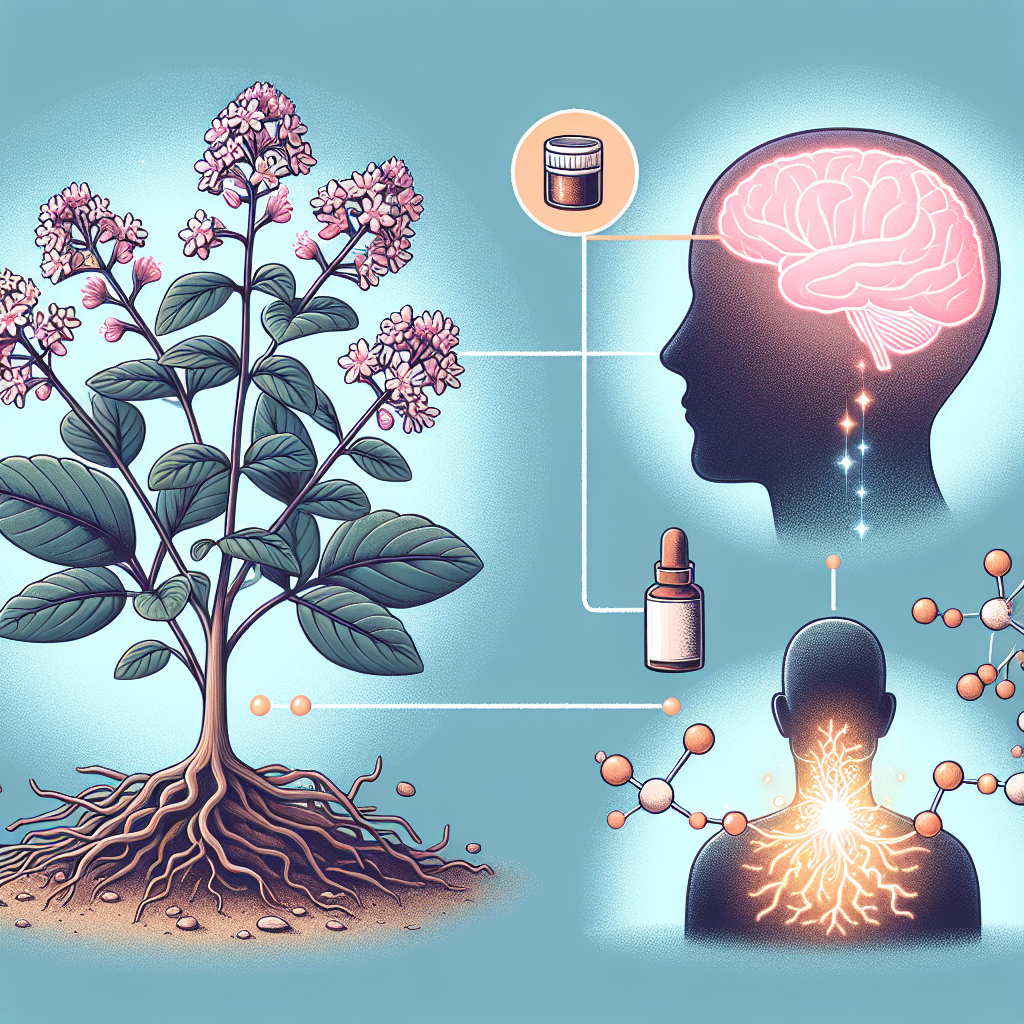The Science Behind Valerian Root as a Sleep Supplement

The Chemistry of Valerian Root: Understanding Its Sedative Properties
Valerian root, a perennial flowering plant native to Europe and Asia, has long been heralded for its sedative properties, making it a popular supplement among those struggling with sleep disorders. The science behind valerian root as a sleep supplement is both fascinating and complex, involving a myriad of active compounds that interact with the human body in subtle yet profound ways. This article delves into the chemistry of valerian root, shedding light on how its sedative properties come to be and why it might be an effective natural remedy for those seeking a good night’s sleep.
At the heart of valerian root’s effectiveness as a sleep aid is its rich composition of bioactive compounds, including valerenic acid, isovaleric acid, and a variety of antioxidants. Valerenic acid, in particular, has been identified as a key player in valerian root’s sedative effects. It is believed to interact with the gamma-aminobutyric acid (GABA) system in the brain, a critical pathway involved in regulating nerve impulses. GABA is an inhibitory neurotransmitter, meaning it can reduce the activity of neurons, leading to a calming effect on the brain. By increasing GABA levels, valerenic acid helps to promote relaxation and improve sleep quality.
Isovaleric acid, another compound found in valerian root, also contributes to its sedative effects, though its mechanism of action is less well understood. Some research suggests that it may work in a manner similar to valerenic acid, by influencing GABAergic activity. Additionally, the antioxidants present in valerian root, such as hesperidin and linarin, may play a role in its calming effects, potentially by reducing oxidative stress within the body, which can interfere with sleep.
The interaction between these compounds and the human body’s biochemistry highlights the complexity of valerian root’s sedative properties. It’s not simply a matter of one compound working in isolation; rather, it’s the synergistic effect of multiple components that contribute to its efficacy as a sleep aid. This complexity is also why the effects of valerian root can vary from person to person, as individual differences in metabolism, genetics, and existing levels of neurotransmitters can influence how one responds to the supplement.
Despite the promising evidence supporting valerian root’s use as a sleep aid, it’s important to approach it with caution. The supplement industry is not as tightly regulated as pharmaceuticals, leading to variability in the quality and concentration of valerian root products on the market. Furthermore, while valerian root is generally considered safe for most people, it can interact with certain medications and may not be suitable for everyone, particularly pregnant or breastfeeding women.
In conclusion, the science behind valerian root as a sleep supplement is rooted in its complex chemistry and the interaction of its bioactive compounds with the human body’s neurological systems. Its ability to increase GABA levels and potentially reduce oxidative stress makes it a compelling natural remedy for improving sleep quality. However, as with any supplement, it’s essential to use valerian root judiciously, taking into account its potential interactions and the variability in product quality. For those considering valerian root as a means to better sleep, consulting with a healthcare provider is a prudent first step.
Valerian Root vs. Synthetic Sleep Aids: A Scientific Comparison

Title: The Science Behind Valerian Root as a Sleep Supplement
In the quest for a good night’s sleep, many individuals find themselves at a crossroads, choosing between natural remedies and synthetic sleep aids. Among the plethora of options, Valerian root emerges as a popular herbal supplement, revered for its sedative qualities. This article delves into the scientific underpinnings of Valerian root as a sleep supplement, juxtaposing it with synthetic alternatives to provide a comprehensive understanding of its efficacy and safety.
Valerian root, derived from the plant Valeriana officinalis, has been used for centuries to treat insomnia and promote relaxation. Its popularity as a sleep aid is not unfounded; numerous studies have explored its mechanism of action, revealing that it increases the levels of gamma-aminobutyric acid (GABA) in the brain. GABA is a neurotransmitter that inhibits nerve transmission in the brain, calming nervous activity. This is akin to the action of synthetic sleep aids, which often target GABA receptors to induce sleep. However, Valerian root does so in a gentler, more natural manner, which may explain its appeal to those wary of the potent effects of synthetic drugs.
Transitioning from the mechanism to the efficacy of Valerian root, research presents a mixed but promising picture. Several clinical trials have demonstrated that Valerian root can improve sleep quality and reduce the time it takes to fall asleep. These benefits are particularly pronounced in individuals with mild insomnia or those experiencing stress-related sleep disturbances. In comparison, synthetic sleep aids, while effective in the short term, often come with a risk of dependency and a plethora of side effects ranging from dizziness to cognitive impairment. This stark contrast underscores the appeal of Valerian root for individuals seeking a safer, non-habit-forming alternative.
However, it’s crucial to approach the use of Valerian root with a scientific lens. Not all studies have found it to be significantly more effective than a placebo, highlighting the variability in individual responses to herbal supplements. Furthermore, the quality and composition of Valerian root supplements can vary widely, affecting their potency and, consequently, their effectiveness. This variability is less of an issue with synthetic sleep aids, which are standardized and regulated for consistent dosing and efficacy.
Safety is another critical aspect of the comparison between Valerian root and synthetic sleep aids. Generally, Valerian root is well-tolerated, with few reported side effects, which are typically mild and may include headaches or gastrointestinal disturbances. In contrast, the side effects of synthetic sleep aids can be more severe and include potential for abuse and withdrawal symptoms upon discontinuation. However, it’s essential to consult with a healthcare provider before starting any new supplement, including Valerian root, especially for individuals with existing health conditions or those taking other medications.
In conclusion, the science behind Valerian root as a sleep supplement presents a compelling case for its use as a natural alternative to synthetic sleep aids. Its mechanism of action, rooted in enhancing GABA activity, offers a gentler approach to improving sleep quality and duration. While research on its efficacy shows variability, the safety profile of Valerian root, coupled with its non-habit-forming nature, makes it an attractive option for those seeking a natural remedy for sleep disturbances. Nonetheless, the decision to use Valerian root should be informed by a thorough understanding of its scientific basis and a consultation with a healthcare professional, ensuring it aligns with individual health needs and circumstances.
The Role of GABA in Valerian Root’s Effectiveness for Sleep Disorders
Valerian root, a perennial flowering plant native to Europe and Asia, has long been heralded for its sedative qualities, making it a popular choice among those struggling with sleep disorders. The science behind valerian root’s effectiveness as a sleep supplement is both fascinating and complex, with much of its potential benefits being attributed to its interaction with gamma-aminobutyric acid (GABA), a key neurotransmitter in the regulation of sleep.
GABA plays a pivotal role in the central nervous system, acting as an inhibitory neurotransmitter that helps to calm neuronal activity. This calming effect is crucial for the initiation of sleep, as it helps to reduce the activity of neurons in the brain, leading to a state of relaxation and, ultimately, sleep. The connection between valerian root and improved sleep patterns is believed to be closely linked to the herb’s ability to influence GABA pathways.
Research into the composition of valerian root has revealed the presence of several compounds that are thought to contribute to its sedative effects. Among these, valerenic acid stands out as a key component. Valerenic acid has been shown to interact with GABA receptors in the brain, increasing the availability of GABA by preventing its breakdown or reuptake. This action enhances the calming, inhibitory effects of GABA, facilitating the onset of sleep and improving sleep quality.
Moreover, valerian root is thought to indirectly influence the body’s natural production of GABA. By interacting with the synthesis pathways, valerian root may help to increase the levels of GABA available in the brain, further promoting relaxation and sleepiness. This dual mechanism of action, both by directly affecting GABA receptors and by influencing GABA production, positions valerian root as a potentially effective natural remedy for those experiencing sleep disturbances.
Despite the promising evidence supporting valerian root’s role in enhancing sleep through its interaction with GABA, it is important to approach its use with caution. The effectiveness of valerian root can vary significantly from person to person, and its sedative effects may not be as pronounced or immediate as those of pharmaceutical sleep aids. Additionally, the quality and composition of valerian root supplements can differ widely, which can impact their effectiveness. Therefore, individuals considering valerian root as a sleep aid should consult with a healthcare provider to ensure it is appropriate for their specific situation.
In conclusion, the science behind valerian root’s effectiveness as a sleep supplement is deeply intertwined with its ability to modulate GABA activity in the brain. By enhancing the inhibitory effects of GABA, valerian root may offer a natural alternative for those seeking to improve their sleep patterns. However, as with any supplement, it is essential to approach its use with an informed perspective, recognizing that individual responses may vary and that further research is needed to fully understand its potential benefits and limitations. As we continue to explore the complexities of natural remedies like valerian root, we move closer to unlocking the full potential of plant-based solutions for enhancing health and well-being.